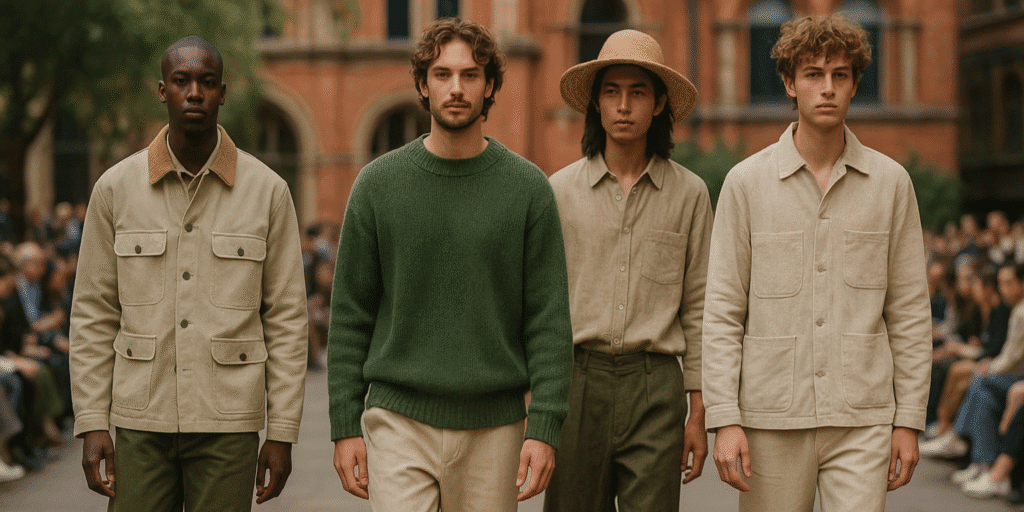London Men’s Fashion Week in November 2023 proved that sustainability is no longer just a buzzword but a central theme in modern menswear. From November 3 to 5, the fashion world gathered to showcase innovative, eco-friendly collections that not only embraced cutting-edge style but also prioritized environmental responsibility. This event underscored a shift in the industry, where fashion isn’t just about looking good, but about doing good for the planet.
Christopher Raeburn: Leading the Charge with Upcycled Materials
One of the standout collections was presented by British designer Christopher Raeburn, known for his commitment to sustainability. Raeburn’s runway show featured bold designs made from upcycled materials, including repurposed parachutes and surplus fabrics. These materials, which would otherwise end up in landfills, were transformed into high-fashion garments, demonstrating how waste can be converted into sophisticated, functional pieces. Raeburn’s work highlighted the need for a circular fashion economy—an approach where garments are recycled, reused, or reimagined rather than discarded.
Raeburn’s presentation was not just about showcasing fashion but about promoting a message that fashion should have a minimal environmental footprint. As a leader in eco-conscious menswear, he emphasized how the industry could shift towards regenerative practices, where the focus is on reducing waste and extending the life cycle of clothing. This approach is becoming more integral as both designers and consumers demand more sustainable solutions from fashion brands.
High-End Streetwear: A Cold Wall and Lush Embrace Sustainability*
In addition to Raeburn’s eco-conscious collection, high-end streetwear brands like A Cold Wall* and Lush also made waves with their use of sustainable fabrics and ethical manufacturing practices. A Cold Wall*, known for its urban aesthetic, introduced a range of street-ready jackets made from biodegradable nylon and plant-based fibers. These materials not only offer durability and style but also contribute to a lower environmental impact, allowing men to embrace fashion that is both stylish and responsible.
Lush, another brand recognized for its sustainability efforts, focused on using materials that support fair trade and local artisans. The brand’s presentation emphasized the importance of ethical labor practices and community-based production, underscoring that fashion can support both workers and the planet. Lush’s commitment to sustainable sourcing, alongside its efforts to minimize waste, reflects the growing importance of ethical fashion that connects conscious consumption with craftsmanship.
Challenges and Consumer Demand for Eco-Friendly Fashion
Behind the scenes, designers discussed the challenges of sourcing sustainable materials and the growing pressure from consumers demanding eco-friendly options. One key challenge noted by many was the availability of sustainable fabrics that meet the high standards of luxury and performance expected by fashion-forward consumers. While brands are increasingly turning to alternative materials like recycled polyester, organic cotton, and biodegradable nylon, the journey to truly sustainable fashion remains complex and costly.
However, there is a clear shift happening, driven largely by the younger generations who prioritize sustainability in every aspect of their lives. From clothing to food to lifestyle choices, these consumers demand that brands take accountability for their environmental impact. This shift has pushed the fashion industry to evolve quickly, with sustainability now seen as an essential element of modern menswear rather than a passing trend.
The Future of Men’s Fashion: Sustainability at Its Core
As the fashion industry continues to evolve, it is clear that sustainability will play an increasingly prominent role in the design, production, and marketing of men’s fashion. The success of collections like Christopher Raeburn’s upcycled designs and A Cold Wall’s* use of plant-based fibers signals a strong movement toward eco-conscious fashion that doesn’t compromise on style or function.
The growing demand for sustainable fashion from consumers is setting the stage for a future where men’s wardrobes are not only stylish but also environmentally responsible. As designers continue to innovate, the barriers to sustainable fashion—from material sourcing to production practices—will likely continue to shrink, making eco-friendly options more accessible and mainstream.
London Men’s Fashion Week 2023 showcased that sustainability is not a niche, but rather the future of fashion—a future where innovation, style, and environmental responsibility go hand in hand. Men’s fashion is embracing a more sustainable and conscious path forward, and it’s clear that this shift will only continue to grow.
Source: Vogue Business
